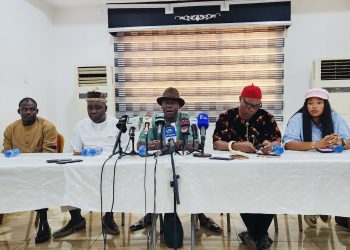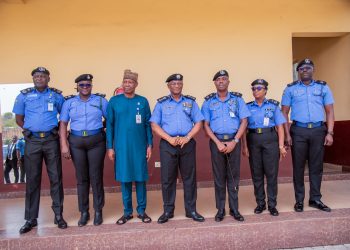By Nkechi Eze
The scourge of ghost workers has long plagued Nigeria’s public sector, with fictitious employees drawing salaries and pensions from the government’s coffers.
This pervasive corruption has not only drained the country’s resources but also undermined the integrity of its institutions.
In recent years, the Independent Corrupt Practices Commission (ICPC) has intensified its efforts to tackle this menace, leveraging its mandate to investigate and prosecute corruption-related offenses. One of the key areas of focus for the ICPC has been the pension sector, where ghost workers have been found to be drawing billions of naira in illicit benefits.
Now, in a major breakthrough, the ICPC has announced the recovery of over ₦20billion siphoned through fraudulent ghost workers’ pension schemes in 2024, marking a significant milestone in the fight against corruption in Nigeria.
This was revealed by the chairman Dr. Musa Adamu Aliyu, SAN, during a meeting with media executives in Abuja, where he engaged in an interactive session themed “Editors’ Breakfast Meeting with ICPC Chairman”.
According to Dr. Aliyu, the ICPC discovered instances of fake workers being added to the payrolls of various government Ministries, Departments, and Agencies (MDAs) during its routine preventive checks.
Further more, Dr. Aliyu explained that the ICPC uncovered the fraudulent insertion of workers in some Ministries, Departments, and Agencies (MDAs) as part of its preventive activities.
He emphasized that the fight against corruption cannot be waged by anti-graft agencies alone, stressing the need for collective efforts to drive national progress.
Highlights of the Chairman’s briefing include but are not limited to the following areas.
Commitment to Due Process and the Rule of Law
According to Dr. Aliyu, the ICPC has adopted a strategic communication approach in line with the 1999 Constitution and the Corrupt Practices and Other Related Offences Act. This ensures that while the Commission remains strict and diligent in its operations, it upholds the rule of law and human dignity.
“Over the years, ICPC has followed a communication strategy guided by Section 36 and Section 27(4) of the 1999 Constitution (as amended) and the Corrupt Practices and Other Related Offences Act, 2000. These legal provisions safeguard suspects’ rights. While we remain firm and meticulous in our duties, we are equally committed to upholding the rule of law and human dignity,” he stated.
Dr. Aliyu also underscored the importance of responsible information dissemination, particularly in safeguarding informants and preserving the integrity of ongoing investigations.
“In matters of enforcement, we share verified information through reports, newsletters, press releases, our website, and social media. However, we ensure that the identities of informants are protected and that the integrity of our investigations is not compromised,” he added.
Strategic Action Plan and Media Engagement
The ICPC Chairman noted that the Commission is not seeking public validation but rather remains focused on delivering measurable results based on its Strategic Action Plan (2024-2028).
“We want our work to be evaluated based on our performance standards, not the need for attention or approval. Our commitment is to provide accurate information without exaggeration or self-promotion. Additionally, we pledge to respond promptly to media inquiries while adhering to legal and ethical guidelines,” he affirmed.
Dr. Aliyu further disclosed that the ICPC is collaborating with reputable civil society organizations to implement a Corruption Prevention Program for Local Governments.
The initiative aims to promote proactive disclosure of financial, procurement, and corruption-related information at the grassroots level.
Call for Media Collaboration
Recognizing the media as a vital stakeholder in the anti-corruption fight, Dr. Aliyu urged journalists to work closely with the ICPC to enhance public awareness and amplify the commission’s programs.
In his opening remarks, Professor Sule Ya’u Sule, fnipr, a lecturer in Strategic Communication and Public Relations at Bayero University, Kano, and a vice president of the Nigerian Institute of Public Relations (NIPR), commended the ICPC for the initiative, stressed the need for his colleagues to support the Commission’s mission by reporting credible and timely information.
Similarly, Mrs. Hussaina Banshika, mni, Director at the Federal Radio Corporation of Nigeria (FRCN) and Deputy Vice Chairman of the Nigerian Guild of Editors (NGE), expressed gratitude for the engagement.
She urged the ICPC Chairman to institutionalize regular interactions with the media to foster greater synergy and collaboration in the fight against corruption.














